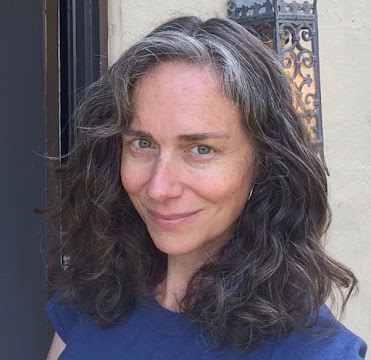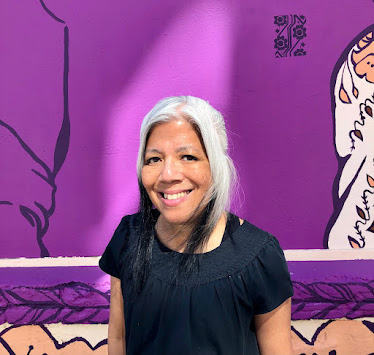The 'process notes' pieces were originally solicited by Maw Shein Win as addendum to her teaching particular poems and poetry collections for various workshops and classes. These poems and process note by Heather Bourbeau is part of her curriculum for her Poetry Workshop at University of San Francisco in their MFA Program for Spring semester of 2023. https://www.usfca.edu/arts-sciences/programs/graduate/writing-mfa
My latest poetry collection Monarch developed in September 2019 during a drive on Highway 3 from Etna to Sawyers Bar to visit my family’s old mining claims, which I hadn’t seen in more than two decades. At every turn, I was flooded with memories of visiting for weeks each summer as a child with my cousins, up to 10 of us children roaming the Siskiyou forest, taught to trust our physical abilities and be aware of the animals that were more powerful than the lot of us—the bears, snakes, and black widows. We would swim and bathe in watering holes so cold our lips turned almost blue, our skin numbed. We would gather rocks, learn to navigate by tree distinctions and sun position, and live without plumbing or consistent electricity for weeks.
These weeks were magic and part of the reason those cousins (who grew up in Oregon) and I (who grew up in Nevada and California) are still close. But as I once again saw this landscape and our role in it with my adult eyes, I began to ask about all the things we were never taught—Whose land was this that we “claimed”? What impact did our small-scale dredging and panning have? What was the original bend and flow of these rivers I thought I knew deep in my belly?
I had already begun one poem “Fire Balloon (Fu-Go)” about a long-range balloon the Japanese Imperial Army sent which exploded in rural Oregon, killing six people (the only World War II US combat casualties in the 48 states) and another poem called “A Man Named Remembrance Recalls the Gold Rush,” based on the recollections of Remembrance Campbell who was a boy during the California Gold Rush in the Sierra foothills. It was this poem (and my research to develop it) had led me to return to my family’s gold claims. Driving through the burn scarred—but still stunning—Siskiyou range, I began to sketch the outline of a collection that would address overlooked histories of the US West that I was raised in (CA, NV, OR, and WA). These were the histories I wish I had been taught as a child, that would have helped me understand the greater context of where and how I lived.
Drawing inspiration from Shawn Wen’s brilliant Twenty Minutes of Silence Followed by Applause which explores the life of Marcel Marceau through a mix of lists, essays, and reportage cum poetry, I knew I wanted to have prose poems bookended by one timeline and one list poem. I also knew I wanted 10 poems for each of the four states and those poems would span early statehood until now. Most importantly, I knew I wanted these poems to be meticulously researched and the stories to be verified by experts and community leaders.
Some topics I immediately knew I wanted to explore, such as “Items Left After Burning Man”:
Items Left After Burning Man
Cellphones, IDs, bags, suitcases,
shirts, jackets, hydration backpacks,
eyeglasses, a partial pair of
dentures,
water bottles, a wedding ring,
a flute, a piano tuning kit, a marching band
hat,
a stuffed bunny, a furry cheetah
vest, a stuffed cow,
single sandals,
chainmail skirt, the
fuselage of a Boeing 747,
100 gallons of oil, grey water,
black water,
800,000 gallons of wastewater,
oxidized decomposed granite, burn
scars.
While other poems came to me after combing academic journals, exhibits at historical museums, and listening to historically-oriented podcasts like “East Bay Yesterday”. I would hear or read something that piqued my curiosity and let the rabbit hole lead me. I would draw on diverse sources of information, including contemporaneous news articles (e.g., from the 1880s), US Department of Agriculture and US Department of Energy reports, autobiographies, Congressional testimonies, myths from and legal challenges by indigenous communities, speeches, family histories, and on-site visits. (There is a 21-page bibliography for this book available on the Cornerstone Press page for Monarch.)
Oftentimes, the poem I thought I would write would be abandoned or postponed as some striking tidbit led me to a place, people, or a history I never could have imagined. This is how I learned about Allensworth (the first town in California to be founded, financed, and governed by African-Americans), which became this poem:
Allensworth
When you reimagine landscapes and liberties, you must
remember
who controls the drip and drought controls the dream.
Allen Allensworth, born a slave, became
seaman, minister, Kentucky delegate
to Republican National Conventions.
1908 Owens Valley farmers were cast aside for aqueduct to
slake Los Angeles.
1908 Allensworth left the City of Angels to build a new Eden—
Central Valley railroad depot, fertile soil, access to water.
Founded, financed,
and governed by Blacks. Free of racism. Able to blossom and
thrive.
Four years later, 100 residents welcomed Alwortha Hall, the
first baby born.
Two general stores, post office, school,
library. Bakery, drug store, hotel.
Poultry and sugar beet farms, plaster
and carpentry shops.
Girl’s Glee Club, Children’s Savings
Association, Debating Society.
But the Railway built a spur to avoid
town, refused to hire Blacks as depot’s
manager or ticket agent. Pacific Farming
never delivered enough water.
And as James Meredith was shot trying to
march across the Mississippi Delta,
arsenic was found in Allensworth’s
water. The town was scheduled for demolition.
In the Golden State, all roads begin and
end with water.
At town’s dedication, Allensworth, the
man, had said, “We must do as they did—
settle upon the bare desert, cause it to
bloom like a rose.” (But Adam and Eve
had Pishon, Gihon, Chidekel, and Phirat pouring forth from a single source.)
In 1908, the Tulare Basin fed artesian
wells, alfalfa, corn, and livestock.
Men harvested fish with buckets. Twenty
years later, Tulare Lake had been drained dry.
As with so much history from the US West, the history of Allensworth is intricately tied to the history of its water sources. This led me to research the Tulare Basin and even Genesis in the Bible, as Allensworth, the man, quoted the rivers of Eden in his dedication speech.
While I was finishing the book (editing, checking line breaks, going back through to fact-check and confirm sources, etc.), I realized that I wanted more than just these poems out in the world. I wanted not only the larger stories, the bigger contexts, and the individuals celebrated to be known beyond the typical poetry audience. I also wanted to encourage people to question what they have and have not been taught about the places they live and grew up in: Whose stories aren’t included? Whose perspectives dominate? Where else might we turn to learn what isn’t in our textbooks?
Therefore, I also worked with high school and college-level educators to develop a Teaching Guide. These are your stories, your histories. If we do not know the painful truths, we are doomed to repeat horrible wrongs, and if we do not know the people who persevered or broke molds, then we might not be able to imagine our own full potential.
Both poems appear in Monarch (Cornerstone Press 2023).
Heather Bourbeau's work has appeared in 100 Word Story, Alaska Quarterly Review, The Kenyon Review, Meridian, The Stockholm Review of Literature, and SWWIM. She is the winner of La Piccioletta Barca’s inaugural competition and the Chapman Magazine Flash Fiction winner, and has twice been nominated for a Pushcart Prize. She has worked with various UN agencies, including the UN peacekeeping mission in Liberia and UNICEF Somalia. Her collection Some Days The Bird is a poetry conversation with the Irish-Australian poet Anne Casey (Beltway Editions, 2022). Her latest collection Monarch is a poetic memoir of overlooked histories from the US West she was raised in (Cornerstone Press, 2023).
Maw Shein Win's recent poetry book is Storage Unit for the Spirit House (Omnidawn), which was nominated for the Northern California Book Award in Poetry, longlisted for the PEN America Open Book Award, and shortlisted for the California Independent Booksellers Alliance's Golden Poppy Award for Poetry. D.A. Powell wrote of it, "Poetry has long been a vessel, a container of history, emotion, perceptions, keepsakes. This piercing, gorgeous collection stands both inside and outside of containment: the porcelain vase of stargazer lilies is considered alongside the galley convicts, the children sleeping on the cement floors of detention cells, the nats inside their spirit houses; the spirit houses inside their storage units.…These poems are portals to other worlds and to our own, a space in which one sees and one is seen. A marvelous, timely, and resilient book." Win's previous collections include Invisible Gifts (Manic D Press); her chapbooks include Ruins of a glittering palace (SPA) and Score and Bone (Nomadic Press). Win’s Process Note Series on periodicities : a journal of poetry and poetics features poets and their process. She is the inaugural poet laureate of El Cerrito and often collaborates with visual artists, musicians, and other writers. mawsheinwin.com




